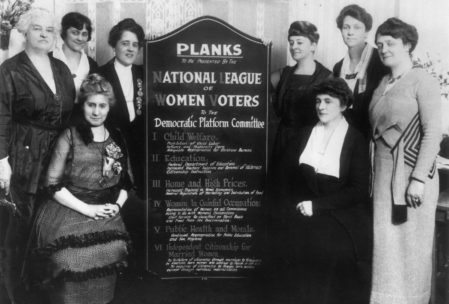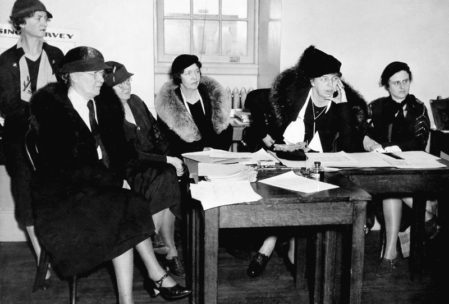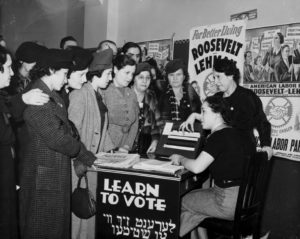Learn about the founding, history and upcoming 100th anniversary of the League of Women Voters of the United States.
Learn about the LWV Oregon and our local chapter HERE.

History of the LWV
- 1920 LWV founded as part of Women’s Suffrage Movement;
- 19th Amendment to Constitution gave women the right to vote 6 months later
- 1973 LWV charter amended to include male voters
- by 2006 grassroots org. has chapters in 50 states, over 150,000 members
- LWV is non-partisan;
- does not endorse or oppose political candidates or parties at any level of govt.
- does support or oppose many political issues after study and consensus
- Our mission is to encourage the informed and active participation of citizens in their govt.
The League of Women Voters was founded in 1920 by Carrie Chapman Catt during the last meeting of the National American Woman Suffrage Association approximately six months before the 19th Amendment gave U.S. women the right to vote. It began as a political experiment aimed at helping newly-enfranchised women exercise their responsibilities as voters.
The LWV works to increase understanding of major public policy issues, and to influence public policy through education and advocacy, as well as through political lobbying of the United States Congress and state and local governments.

How LWV is organized
Voters Service and Citizen Education nationwide
The Voters Service and Citizen Education portion of the LWV informs and educates voters about candidates, the electoral process, and issues on which the LWV has no position.
- 1976, 1980, and 1984, sponsored presidential debates
- Sponsors and moderates candidates’ forums and debates for local and state elections across the country
- Produces and disperses Voter’s Guides that compares candidates’ positions on various issues
- Provides staff for precincts on Election Day
- The LWV is a strong supporter of transparency in government and many chapters send members to observe meetings of governmental bodies.
On October 2, 1988, the LWVUS’s 14 trustees voted unanimously to pull out of national debate sponsorship because the demands of the two campaign organizations would perpetrate a fraud on the American voter. On October 3, they issued a dramatic press release in protest of the major party candidates attempting to dictate nearly every aspect of how the debates were to be conducted, which ultimately resulted in the Democratic and Republican parties forming the Commission on Presidential Debates which gave the parties greater control over the debate environment. LWVUS said “It has become clear to us that the candidates’ organizations aim to add debates to their list of campaign-trail charades, devoid of substance, spontaneity and answers to tough questions. The League has no intention of becoming an accessory to the hoodwinking of the American public.”
Program and Action
Presents information on various issues
- Studies issues at local, state, and national levels
- Reaches consensus on issues
- Writes Position Papers on issues for:
- Voter education
- Voter action
Our Program and Action component presents information on various issues that are studied for the purpose of taking a position. Through a group discussion process, League chapters work to come to a consensus on a specific topic at local, state, or national levels. When consensus is reached, a position statement can be issued that League members can then support and use to educate the general public or lobby government.

Joining locally makes a person a member at all levels, entitled to the National Voter magazine, and participation in activities at local, state, and national levels.
That is a very interesting article. Ir helped since Nina Pence was a good friend